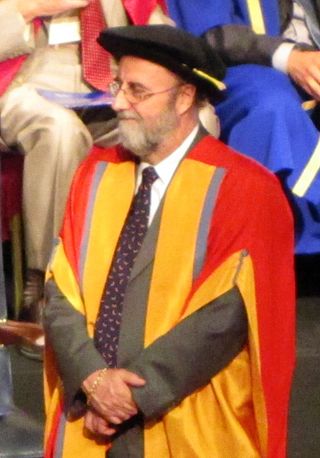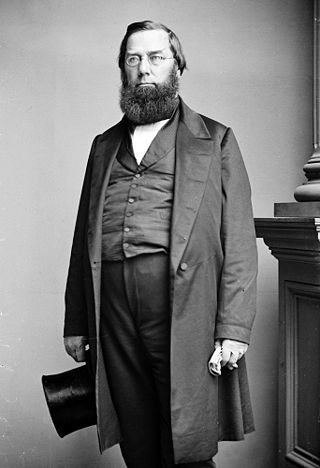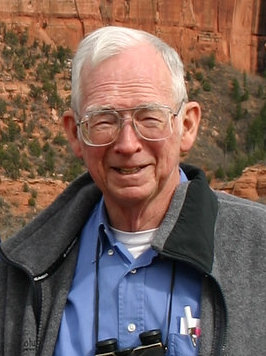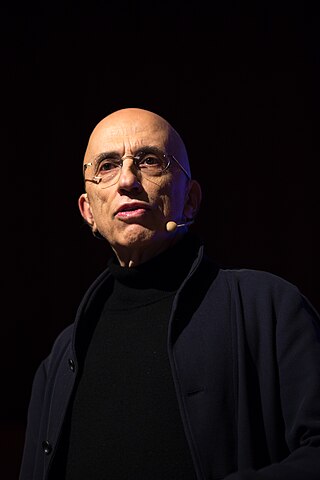
The organized environmental movement is represented by a wide range of non-governmental organizations or NGOs that seek to address environmental issues in the United States. They operate on local, national, and international scales. Environmental NGOs vary widely in political views and in the ways they seek to influence the environmental policy of the United States and other governments.

Siegfried Fred Singer was an Austrian-born American physicist and emeritus professor of environmental science at the University of Virginia, trained as an atmospheric physicist. He was known for rejecting the scientific consensus on several issues, including climate change, the connection between UV-B exposure and melanoma rates, stratospheric ozone loss being caused by chlorofluoro compounds, often used as refrigerants, and the health risks of passive smoking.

Sir Robert Tony Watson CMG FRS is a British chemist who has worked on atmospheric science issues including ozone depletion, global warming and paleoclimatology since the 1980s. Most recently, he is lead author of the February 2021 U.N. report Making Peace with Nature.

Human ecology is an interdisciplinary and transdisciplinary study of the relationship between humans and their natural, social, and built environments. The philosophy and study of human ecology has a diffuse history with advancements in ecology, geography, sociology, psychology, anthropology, zoology, epidemiology, public health, and home economics, among others.
In environmental philosophy, environmental ethics is an established field of practical philosophy "which reconstructs the essential types of argumentation that can be made for protecting natural entities and the sustainable use of natural resources." The main competing paradigms are anthropocentrism, physiocentrism, and theocentrism. Environmental ethics exerts influence on a large range of disciplines including environmental law, environmental sociology, ecotheology, ecological economics, ecology and environmental geography.

Ecological economics, bioeconomics, ecolonomy, eco-economics, or ecol-econ is both a transdisciplinary and an interdisciplinary field of academic research addressing the interdependence and coevolution of human economies and natural ecosystems, both intertemporally and spatially. By treating the economy as a subsystem of Earth's larger ecosystem, and by emphasizing the preservation of natural capital, the field of ecological economics is differentiated from environmental economics, which is the mainstream economic analysis of the environment. One survey of German economists found that ecological and environmental economics are different schools of economic thought, with ecological economists emphasizing strong sustainability and rejecting the proposition that physical (human-made) capital can substitute for natural capital.

Deepak Chopra is an Indian-American author and alternative medicine advocate. A prominent figure in the New Age movement, his books and videos have made him one of the best-known and wealthiest figures in alternative medicine. His discussions of quantum healing have been characterised as technobabble – "incoherent babbling strewn with scientific terms" which drives those who actually understand physics "crazy" and as "redefining Wrong".
David Cromwell is a British media campaigner and oceanographer. With David Edwards, he is a co-editor of the Media Lens website.

George Perkins Marsh, an American diplomat and philologist, is considered by some to be America's first environmentalist and by recognizing the irreversible impact of man's actions on the earth, a precursor to the sustainability concept, although "conservationist" would be more accurate. The Marsh-Billings-Rockefeller National Historical Park in Vermont takes its name, in part, from Marsh. His 1864 book Man and Nature had a great impact in many parts of the world.

Holmes Rolston III is a philosopher who is University Distinguished Professor of Philosophy at Colorado State University. He is best known for his contributions to environmental ethics and the relationship between science and religion. Among other honors, Rolston won the 2003 Templeton Prize, awarded by Prince Philip in Buckingham Palace. He gave the Gifford Lectures, University of Edinburgh, 1997–1998. He also serves on the Advisory Council of METI.

Environmental history is the study of human interaction with the natural world over time, emphasising the active role nature plays in influencing human affairs and vice versa.

Environmentalism or environmental rights is a broad philosophy, ideology, and social movement regarding concerns for environmental protection and improvement of the health of the environment, particularly as the measure for this health seeks to incorporate the impact of changes to the environment on humans, animals, plants and non-living matter. While environmentalism focuses more on the environmental and nature-related aspects of green ideology and politics, ecologism combines the ideology of social ecology and environmentalism. Ecologism is more commonly used in continental European languages, while environmentalism is more commonly used in English but the words have slightly different connotations.

Thomas Berry, CP was a Catholic priest, cultural historian, and scholar of the world's religions, especially Asian traditions. Later, as he studied Earth history and evolution, he called himself a "geologian".

Systems ecology is an interdisciplinary field of ecology, a subset of Earth system science, that takes a holistic approach to the study of ecological systems, especially ecosystems. Systems ecology can be seen as an application of general systems theory to ecology. Central to the systems ecology approach is the idea that an ecosystem is a complex system exhibiting emergent properties. Systems ecology focuses on interactions and transactions within and between biological and ecological systems, and is especially concerned with the way the functioning of ecosystems can be influenced by human interventions. It uses and extends concepts from thermodynamics and develops other macroscopic descriptions of complex systems.

Environmental philosophy is a branch of philosophy that is concerned with the natural environment and humans' place within it. It asks crucial questions about human environmental relations such as "What do we mean when we talk about nature?" "What is the value of the natural, that is non-human environment to us, or in itself?" "How should we respond to environmental challenges such as environmental degradation, pollution and climate change?" "How can we best understand the relationship between the natural world and human technology and development?" and "What is our place in the natural world?" Environmental philosophy includes environmental ethics, environmental aesthetics, ecofeminism, environmental hermeneutics, and environmental theology. Some of the main areas of interest for environmental philosophers are:

William Dawbney Nordhaus is an American economist, a Sterling Professor of Economics at Yale University, best known for his work in economic modeling and climate change, and one of the 2 recipients of the 2018 Nobel Memorial Prize in Economic Sciences. Nordhaus received the prize "for integrating climate change into long-run macroeconomic analysis".

Menas C. Kafatos is a Greek-born American physicist and a writer on spirituality and science. His publications include: The Nonlocal Universe and The Conscious Universe. Kafatos has written and lectured extensively promoting discourse between science, spirituality, and religion. He has held numerous positions at institutions including Chapman University, George Mason University, and NASA Goddard Space Flight Center.

Ecocide is destruction of the natural environment that is widespread, long-term and severe. The concept of ecocide originated in the 1970s after the United States devastated the environment in Vietnam through use of Agent Orange during the Vietnam War.

You Are the Universe: Discovering Your Cosmic Self and Why It Matters is a new-age philosophy book co-written by Deepak Chopra and Menas Kafatos. The book delves into questions pertaining to existence, human existence, consciousness, reality and perception. It was published on February 7, 2017 and became a New York Times best-seller.

Clive L. Spash is an ecological economist. He currently holds the Chair of Public Policy and Governance at Vienna University of Economics and Business, appointed in 2010. He is also Editor-in-Chief of the academic journal Environmental Values.

















